
PROTESTERS OUTSIDE AG NESSEL’S OFFICE MAY 25, 2019 Photo: Christine Abood
A Michigan court tasked with protecting its most vulnerable citizens has become home to a roiling controversy charging abuse, exploitation, robbery and neglect.
Part One of Five: Unacknowledged and Unprotected
By Gretchen Rachel Hammond
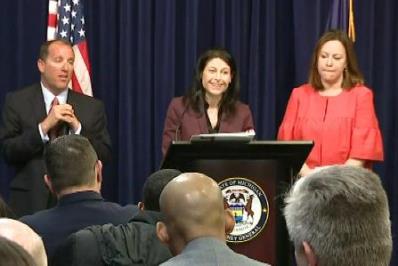
Michigan AG Dana Nessel, with MSC Justice Richard Bernstein at left, Justice Megan Cavanagh at right, announces formation of Elder Abuse Task Force May 25, 2019.
In the frigid, early morning of Monday, March 25, 2019, Michigan Attorney General Dana Nessel held a press conference announcing a taskforce primarily charged with reforming a court system rooted in medieval English law.
According to state and national activists, it’s a system that has been left unchecked for decades and is now so broken that it has led to unprecedented judicial overeach and the eradication of the constitutional, civil and human rights of thousands of Americans who have suffered from resulting neglect, isolation, abuse, torture and theft on a massive scale, allegedly at the hands of the same individuals assigned to protect them.
Both in Michigan and nationwide, the system is called “guardianship” and/or “conservatorship.”
Once assigned to an individual that a probate or family court judge declares “legally incapacitated” and unable to manage their own affairs, often a complete stranger in the form of a court-appointed guardian or conservator assumes control over every aspect of that person’s life.

U.S. Veteran Gayle Robinson, 83, of Westland, Michigan was forced out of the home in which she and her husband raised 10 children and lived for 50 years, and into a nursing home, by Wayne Co. Probate Court.
Every last possession, penny and decision is handed over to one of Michigan’s professional guardians and conservators culled from a pool of county public administrators, estate and probate attorneys or private guardianship companies.
In as little as a year, wards have been rendered completely indigent and reliant upon social services and benefits such as Medicaid. Their homes are gone, as are their savings accounts, IRAs, investment accounts, cars, personal belongings, keepsakes, heirlooms, jewelry and even their clothing. Every dollar of their social security, disability income or pensions falls under the control of their guardians with the exception of an allowance as low as $60 per month.
Inevitably, it’s the developmentally disabled and exponentially growing senior populations who are the most affected not only in Michigan but nationwide. Advocates for both groups claim that guardianship, by design, results in a “civil death” for those who are subjected to it and that, although free from any charges of wrongdoing, a person under guardianship has less rights than an imprisoned felon.

Gayle Robinson at the Montford Marine Corps Black History Month Dinner in 2010.
Pro-guardianship organizations claim such statements are histrionic; that a guardian has simply assumed the rights of an incapacitated individual, also called a “ward,” as a protective barrier against those who would exploit them.
However, across the country, wards and their families have come forward with stories, detailing the brutality and horror of a life under guardianship, that belong more in a ruthless, dystopian autocracy than the American experience. In a country where personal freedoms and the rule of law are sacrosanct, incredulous listeners repeatedly ask, “How can this possibly be true? How can this possibly be legal?”
In Michigan, it is not only legal but shockingly easy for an individual to suddenly find themselves under a guardianship. It is a process that begins with a two-page petition filed in a county probate court with no corroborating medical evidence of incapacity and, often, without the knowledge of the prospective ward or their families.
A Life Sentence
In the hours before Nessel’s press conference started, a small group of these families gathered on the broad sidewalk outside the entrance to her offices in Lansing, Michigan. Among them were retired teachers, artists, business owners and homemakers. Black, white, working- and middle- class, they were staunch Republicans, centrists and far-left Democrats, devout Christians and equally outspoken atheists.

Notorious Guardian/Atty. Mary Rowan (seated in blue) grabs Mailauni Williams’ arm in Wayne Co. Probate Court June 13, 2013. Mailauni was the goddaughter of Rosa Parks. Rowan seized the developmentally disabled young woman; her mother did not know where she was at for weeks and it took her months to regain custody. Photo: Cornell Squires
Once–strangers from wildly different backgrounds, they have been united into a small army fighting a daily war so impossible, so emotionally and financially devastating, that only the tiniest shreds of optimism keep it alive.
Optimism brought them to Nessel’s office, where, huddled together in heavy coats holding signs emblazoned in multicolored lettering, they hoped to finally be heard, believed and for something to be done about what they say is unfettered corruption inside Michigan’s probate courtrooms that has terrorized entire communities, no matter their racial, religious, financial or social backgrounds. Even the families and friends of American icons Aretha Franklin and Rosa Parks have been affected.
Families of individuals under guardianship and conservatorship claim that, during a hearing that typically lasted under four minutes, their loved ones were stripped of their freedom by the state’s probate judges with no due process, no jury present and scant testimony offered via the opinion of a probate and estate attorney who had no medical or psychological training.
Their days are now spent inside a long-term care or assisted living facility, placed in a lockdown ward or hidden behind the front door of group homes both licensed and unlicensed, sometimes in subhuman living conditions. Families assert that it is a life sentence for the innocent in which they are drugged and isolated from those who challenge the presiding judge and appointed guardian by fighting for their loved one’s release.
Present Michigan statute is supposed to protect a ward’s statutory rights, such as the right to request a limit on the guardian’s powers or attend a guardianship hearing,. However, attorneys state that judges are routinely ignoring it. Multiple efforts to strengthen the statute, through legislative recommendations made by successive guardianship and senior taskforces, have failed.
We Don’t Have a Say?

Victoria McCasey of Holly and Randy Asplund of Ann Arbor were among group of protesters outside AG office May 25, 2019.
A freelance artist and illustrator, 58-year-old Randy Asplund (shown in photo at left) has been forbidden from seeing his mother Roberta for the past eight months. During her recovery from brain surgery, a 2017 petition for guardianship and conservatorship was filed against Roberta in Ann Arbor’s Washtenaw County Probate Court.
Presiding Judge Julia B. Owdziej declared Roberta incapacitated and, ultimately placed under the guardianship and conservatorship of her to two estate and probate attorneys.
Roberta remains under their control and has been isolated from her son since November 2018, when he tried to bring a legal challenge against the court’s decision to appoint them. Meanwhile, Asplund says his mother’s home has been stripped and her belongings sold off or trashed. He is presently appealing the case and fighting to stop the sale of her house.

Roberta and Randy Asplund, X-mas 2017
“These are people needing to be investigated, prosecuted and jailed,” Asplund says. “Laws are ignored and violated by the courts. The judges use their power to ensure that professional fiduciaries prevail in court, and the ward is almost never able to escape a guardianship or conservatorship.”
But, on March 25, all that was supposed to change with Nessel’s formation of an Elder Abuse Task Force.
Standing outside Nessel’s office, Asplund and his fellow protestors were met with curious glances by passing members of the media hurrying to the press conference. While Asplund managed to tempt a journalist or photographer into a brief, reluctant conversation, others in the group followed the invited members of the media inside the lobby and begged to be allowed to join the event.
Retired Detroit teacher Christine Abood was among them.

Christine Abood with mother Gloria Sullivan
In 2016, her mother Gloria was placed under the control of Oakland County Public Administrator John Yun who put her in a Novi, Michigan, nursing facility. Abood and her sons say they were unable to be at Gloria’s bedside on the night she died because she had been moved and Yun didn’t know where she was.
“I will never forget that, never,” Abood says. “He was supposed to care for her and he didn’t even know where she’d been moved? Why?”
It was a question Abood raised during a 45-minute back-and-forth argument with Nessel’s staffers, who refused her and the other families access to the press conference. She left the lobby, throwing her arms up in exasperation.
“They told us to watch it on Facebook!” She cried to the others. “This is about our families. We’ve been waiting and pleading for something like this and we can’t be a part of it? We don’t have a say?”
An Unacknowledged Narrative
The only victim of elder abuse who was allowed inside the event to tell his story, and so become a focal point for subsequent media coverage of the announcement, was Dennie Burgio (72) who was robbed of his life savings by a close friend.
Nessel emphasized that the majority of elder abuse was perpetrated at the hands of family and friends, a line later echoed by the state’s pro-guardianship lobbyist, the Michigan Guardianship Association (MGA)
” . . . investigations into alleged abuses perpetrated by probate attorneys acting as court-appointed guardians and conservators were never raised” by Nessel
Flanked by Michigan Supreme Court Justices Richard Bernstein and Megan Cavanaugh, Nessel announced nine initial reforms of Michigan’s guardianship system. However, investigations into alleged abuses perpetrated by probate attorneys acting as court-appointed guardians and conservators were never raised. Neither Bernstein nor Cavanaugh raised the prospect of Judicial Tenure Commision investigations into the actions of probate judges.
This, despite the families of those victims having called and emailed both Nessel’s office and that of her predecessors to alert them, as well as filing complaints with both the Michigan Attorney Grievance and Judicial Tenure Commissions.

Milton Mack, now head of SCAO, controls courts state-wide; he was originally head of scandal-plagued Wayne Co. Probate Court, a chief actor in abuse by guardians.
Their complaints, the families assert, were ignored or dismissed; part of an agonizing cycle during which they have been routinely brushed aside not only by the Attorney General’s office but local police, county prosecutors, the State Court Administrator, the Detroit office of the Department of Justice and even local media outlets.
“They tell us to ‘get an attorney,’”Abood says.
It is something easier said than done and, according to national advocates, a challenge common to most families fighting probate cases across the country.
“I’ve been told by local attorneys [that] they wouldn’t take my case because the corruption is too much to prevail,” Asplund notes. “I had to go from Ann Arbor to Lansing to find an attorney who did not usually appear in front of my judge or who relied on the court for business.”
Perplexed as to why they were not invited to the press conference, Asplund, Abood and the rest of the families gathered their collective optimism around an iPhone with the clearest signal and cheered when Nessel pledged that the Taskforce would reform the way the Michigan’s probate courts treat the state’s most vulnerable.
“We know what the problems are,” Nessel said. “So much of being able to cure the problem is to be able to better identify it, how often it’s happening and where.”
But that was far from the end of the story.
The Oakland County Fortress

OAKLAND COUNTY PROBATE COURT, 1200 NORTH TELEGRAPH, PONTIAC, MI
It’s never a good idea to be running late on a Wednesday at The Oakland County Sixth Circuit and Probate Courts, both housed in a stark complex of white and beige structures on 1200 North Telegraph in the Detroit, Michigan, suburb of Pontiac.
On ritualistically called “Motion Days,” each courtroom has a hefty tally of cases that can be called and over in just a few minutes—far quicker than it takes to get inside what local historians once described as a “fortress.”
With the exception of jurors, employees and attorneys, cell phones or recording devices are strictly forbidden. Videos of probate court proceedings must be ordered in advance and can only be watched in the court’s administrative offices. Probate court documents are not subject to Michigan’s Freedom of Information Act (FOIA) and can only be reviewed at the court’s sole public computer or purchased at the cost of $1-per-page plus a service fee.
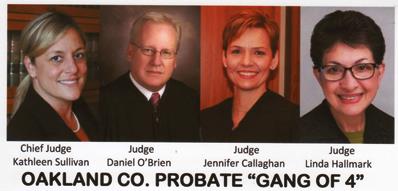 Behind its walls to public access, Oakland County Probate Court Chief Judge Kathleen A. Ryan, and Judges Linda S. Hallmark, Daniel A. O’Brien and Jennifer Callaghan rule on a list of issues including adult guardianships/conservatorships for incapacitated individuals.
Behind its walls to public access, Oakland County Probate Court Chief Judge Kathleen A. Ryan, and Judges Linda S. Hallmark, Daniel A. O’Brien and Jennifer Callaghan rule on a list of issues including adult guardianships/conservatorships for incapacitated individuals.
Although in the same building as the Sixth Circuit, their courtrooms operate autonomously from it and with little or no oversight, with the exception of rulings occasionally overturned by the Michigan Court of Appeals. Despite some of those cases revealing shocking judicial actions, in the last 30 years, there have been no formal investigations of an Oakland County Probate Court judge.
True to its description, the court has been as unassailable as the majority of decisions made with a single stroke of a judge’s pen on an order finding a person to be legally incapacitated.
According to the wards, their family members, attorneys, and local and national advocates who were interviewed for this investigation, the consequences of that order are devastating and lifelong.
Lunatics and Idiots
The practice of guardianship has been traced back to 1270 England, when King Henry III “assumed control over the estates of lunatics and idiots.”
As with other laws exported to former British colonies that are still practiced in some form, although the language has changed, the basic principles of guardianship in the United States remain the same, and it is a system about which the majority of Americans remain hopelessly uneducated.
Individuals who are declared incapacitated by civil, family and probate court judges across the US are forced to cede their lives to an authority figure who takes complete control of their homes, mail, bank accounts, retirement and social security income, IRAs, life and health insurance, wills and trusts, property, passports, driver’s licenses and voter registration cards.

Rebecca Fierle, Guardian “angel of death”
He or she also dictates where a ward will live, whether they can own a cellphone or a computer, where they may or may not go, who they are and are not allowed to see and what they are or are not allowed to eat.
In fact, any personal, professional and medical decisions are no longer legally the ward’s own, including requests to doctors to dispense or withhold medication, and whether a Do Not Resuscitate (DNR) order should be enabled and enforced.
Such unilateral power has proven to be ripe for abuse.
In Florida, professional guardian Rebecca Fierle was recently accused of executing DNR orders on her wards without the knowledge or consent of her wards or their family members. One of her wards died of starvation after his feeding tube was capped off.
Marcia Southwick is a Director of the National Association to Stop Guardianship Abuse (NASGA). See https://stopguardianabuse.org/.
“It should be blatantly obvious to all who approve of this very old and very entrenched system that such overarching authority should be closely monitored to ensure that wards are safe,” she says. “However, that is not the case. Based on flimsy ‘evidence,’ a person can lose his or her fundamental rights to liberty and property and be handed off to a professional who isn’t monitored or held sufficiently accountable for the welfare of the ward and their assets.” 
“A Corrupt Game”
Under Michigan statute, an incapacitated individual is someone who “By reason of mental illness, mental deficiency, physical illness or disability, chronic use of drugs, chronic intoxication, or other cause, [lacks] sufficient understanding or capacity to make or communicate informed decisions.”
A guardian is responsible for the ward’s care, custody and control. A conservator (or fiduciary), handles finances and decisions regarding assets that include managing income, real estate, savings and investments. Both positions are granted a substantial list of powers and can be given to a sole individual.
Michigan gives family members priority over court-appointed guardians who are either estate and probate attorneys, populating one of the largest sections of the State Bar of Michigan (SBM) or private guardianship companies. They are only supposed to step in only when a judge determines that family members or individuals listed on a potential ward’s Durable Power of Attorney documents are unable, unwilling or unsuitable to fill the role.
Some attorneys are appointed as County Public Administrators by the Michigan Attorney General’s office. Primary to their job description is to act as representatives to the estates of deceased individuals where there are no discernable heirs. Nowhere in their job description is it stated that they can act as guardians and conservators.
Yet, Oakland County maintains a present list of 13 public administrators who do just that.

Congratulating Oakland County Probate Court Chief Judge Kathleen A. Ryan (second from right) at the Spring Conference were (left to right) Georgia Callis, vice president, Michigan Guardianship Association; State Court Administrator Milton Mack Jr.; and Amy Katz, president. Michigan Guardianship Association.
In its last statewide caseload statistics for 2018, the Michigan State Supreme Court listed a total of 60,712 adults and developmentally disabled individuals under guardianship and 10,912 adults with a conservator.
With the exception of Veterans (limited to ten), the number of wards each guardian can have is not mandated by state law and varies depending on the size of the county. However, figures which have showed one guardian or guardianship company with over 400 wards caused Nessel’s Elder Abuse Task Force to propose limits, a measure the Michigan Guardianship Association announced they intend to fight.
As of December 31, 2018, the Oakland County Probate Court had 7,064 open adult and developmentally disabled guardianship cases and 1,417 conservatorships.
A guardianship and/or conservatorship in Michigan begins when a petition is filed in a probate court. The two-page document can be filed by anyone, such as a relative, spouse, friend or neighbor of a prospective ward as well as an outside agency including Michigan’s Adult Protective Services (APS), a nursing facility or hospital. Once filed, the probate court contracts and assigns a Guardian ad Litem (GAL) to investigate and determine what actions are in his/her best interests.
In Oakland County, the GAL is an estate and probate attorney who not only files and verbally delivers a report to a judge but acts as a surrogate prosecutor questioning witnesses and cross- examining wards and family members, regardless of whether they are represented by an attorney.
For their services, GALs are paid directly from the ward’s estate.
One guardianship and conservatorship case was decided in O’Brien’s packed and stuffy courtroom on the Motion Day falling on October 10, 2018.

Matthew Martin, Senior Care Network
By the time the case number was called, it was close to lunch and O’Brien had grown increasingly impatient, sternly telling any quibbling attorneys or litigants to “move it along.”
The case was a contested hearing to settle the future of 76-year-old John. For privacy reasons, his last name has been excluded.
The petitioner was Matthew Martin, an external case manager for the Northville, Michigan- based care management company Senior Care Network, an organization which regularly files Oakland County guardianship petitions, who claimed John needed 24-hour care and “assistance applying for Medicaid.”
In delivering his findings as John’s GAL, estate and probate attorney Drew Carnwath recommended that O’Brien assign a public administrator to act as John’s guardian.
O’Brien asked Carnwath to recommend one himself.
Since that was a decision usually made by a judge, Carnwath was confused. “Well, I …” he began.
O’Brien interrupted. “So I don’t get accused of being in on some sort of corrupt game.”
Media-Assisted Accountability
In 1987, an Associated Press investigation of guardianship practices in all 50 states first uncovered what it described as a “burdened and troubled system that regularly puts elderly lives in the hands of others with little or no evidence of necessity, then fails to guard against abuse, theft and neglect.”
In the more than three decades since, it is invariably local journalists, rather than state or federal law enforcement agencies, who have taken the pleas of wards or families allegedly victimized by private or public guardians seriously and launched their own investigations.
In Nevada, New Mexico, New York, Florida, Pennsylvania, Ohio, Texas and California, to name a few, shocking cases have emerged that, together, form an almost identical pattern of behavior. In exercising their powers of protection, guardians and conservators have forced individuals and even couples from their homes and into nursing or assisted living facilities.
Estates that were once worth millions are systematically drained through massive over-billing, unreported expenses or outright theft. Homes in which wards have lived and raised a family for decades are seized and looted by the state. Guardian accountability and reporting requirements, inconsistent from state to state, are not properly followed or disregarded entirely.
In Texas, Nevada and Florida, such inattention led to wards who died while under guardianship.
Litigation costs for families are colossal and can stretch into years. When families try to seek help from local law enforcement, a city prosecutor, Attorney General or Department of Justice (DOJ) office, they’re sent packing.
Concerning History

Atty. Alan A. May
As part of the 1987 Associated Press investigation in Michigan, journalist Mark Fritz concluded that “Many of Michigan’s elderly people are being stripped of their homes, their incomes and their most basic rights under a misused and poorly monitored legal process that varies wildly in the state’s 83 counties.”
During a brief interview with Fritz, then–Southfield Michigan attorney Alan A. May admitted to “little personal contact” with his 400 wards.
“That is not a knock. That is a truth. There is very little visitation,” May said at the time.
May is currently a shareholder at the Troy, Michigan, law firm of Kemp Klein, a number of whose former attorneys have taken or presently take on cases at the Oakland County Probate Court, including Barbara Andruccioli, Jon B. Munger and Thomas Brennan Fraser.
All three have troubled pasts.
In November 2016, Detroit ABC affiliate WXYZ journalist Heather Catallo launched a year- long investigation into Andruccioli and then–Macomb County Public Administrator Cecil St. Pierre, during which it was alleged that they had partnered with Utica, Michigan, realtor Ralph Roberts in order to open probate cases on deceased estates without notifying the next-of-kin.
Although not included in WXYZ’s investigation, in 2015 Munger was listed as a defendant in a lawsuit filed in Macomb County District Court in which it was alleged that he had been retained by Roberts to open up a probate case on the deceased estate of Helen Ann Adolph. According to the plaintiffs, Munger’s subsequent sale of Adolph’s home was not approved by the probate court.
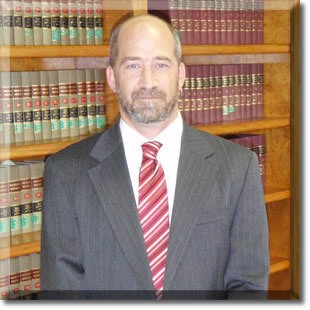
Jon Munger
Andruccioli and Munger were subsequently fired from their roles as public administrators by the Attorney General’s office. St. Pierre was suspended and then resigned.
To date, no criminal charges have been filed.
Munger is still accepting guardianship, conservatorship and deceased estate cases at the Oakland County Probate Court. Roberts and St. Pierre are also still in business. Without explanation, Andruccioli was hired by all four judges as the Oakland County Probate Court Register and paid the highest possible salary of $102,650.
In October 2017, WXYZ aired a short series looking into Fraser’s activities as guardian and conservator, highlighting the billing and treatment of his wards. Ex-Parte motions (emergency and temporary petitions and orders filed without notifying the opposing party) were entered with O’Brien in an attempt to stop the story and any images of the alleged victims’ faces. After an Emergency Appeal was filed with the Michigan Court of Appeals, WXYZ prevailed on First Amendment grounds.
Scorched Earth Litigation
In June 2018, the online national magazine Tablet published an investigation into Munger who, two years earlier, had been given guardianship and conservatorship over a then–92-year-old Oak Park, Michigan, woman Virginia Wahab.

Plaintiff Mimi Wahab Brun with her mother Virginia “Jean” Wahab. Mrs. Wahab passed away in April, 2019 after a two-year ordeal in the Lourdes Nursing Home, which held her against her will. Visits with her daughter were barred
The petition was filed with Oakland County Judge Linda S. Hallmark by a social worker for Lourdes Senior Community, the short-term nursing and rehabilitation center at which Wahab was receiving treatment. Lourdes sought the guardianship because of a $32,000 past-due-bill.
Michigan law does not provide for the use of a probate court as a collection agency.
During her more than two-year fight to regain custody of her mother, Wahab’s daughter Mimi Brun claimed she was denied visitation rights, had a warrant issued by Hallmark for her arrest and filed three reports with the local police department asserting that Munger had illegally entered her mother’s home and looted it.
After the story was published, a July 30, 2018 bench trial on Brun’s petition to terminate the guardianship and conservatorship of Munger was presided over by Hallmark. During a day-long deposition, Munger was asked how many times he had been appointed as a guardian.
“Several thousand,” he replied, but could not precisely cite the Michigan statute under which a guardian is considered necessary.
He admitted to entering Wahab’s home to look for “Information about ownership, assets, bills, any of the above” and to taking a painting that was hanging on Wahab’s wall.
“It’s very colorful. I walk around it every day in my office,” Munger noted. When asked if he had seen his ward lately, Munger replied, “In 2018, I doubt it.”
He also admitted that he hadn’t reviewed Wahab’s medical records since his first visit in 2016.
After a second day of testimony, the trial was adjourned. Before it could resume, Hallmark issued an August 3 opinion and order terminating Munger as guardian and conservator.
“Mr. Munger has satisfactorily provided care, control and custody of Ms. Wahab,” Hallmark wrote. “In all of these matters, Mimi Brun has interfered with Mr. Munger using misinformation, obfuscation and self-dealing. She has engaged in scorched earth litigation. Ms. Brun has demonstrated a complete lack of authority because she believes herself to be the victim.”
“The litigation in this matter has been ongoing for two years,” Hallmark concluded. “The financial and emotional costs to the ward have been significant. It is not in the ward’s best interests for the litigation to continue. Her assets have been depleted but remain with the family.”

This was the pleasant Oak Park home and neighborhood Virginia Wahab was kidnapped from.
Wahab was returned to her Oak Park Home. She remained under Brun’s care until she passed away in April 2019.
One month later, Brun filed a lawsuit against Lourdes alleging that the facility falsely imprisoned and ransomed her mother. Lourdes has since filed a Motion to Dismiss and asked for punitive sanctions against Brun and her attorney. That case is presently pending.
The Consequences of Talking
Families claim there are very few Michigan attorneys who are willing to take their cases against an Oakland County Public Administrator, and that those who do charge retainers that are far out of a family’s reach.
The Oakland County Probate Court has a reputation that’s no secret to attorneys practicing Michigan estate and probate law. Those who agreed to talk about the court admitted to a pervasive fear of openly criticizing any of the four judges or Oakland County Public Administrators. The attorneys claim that making such a challenge, whether in court or in public, can lead to sanctions placed against them or the possible removal of their license by Michigan’s Attorney Discipline Board.
One attorney, who has defended wards and families in front of Hallmark and O’Brien, spoke on condition of anonymity and was given the alias “Paul.”
“I knew of one client who has been through 60 separate attorneys, none of whom would help her,” he says. “I’ve heard from clients whose previous attorneys were threatened.”
While threats do not deter him from taking on Oakland County Probate Court cases, there have been consequences.

Thomas Brennan Fraser
“The judges have been sanctioning me for no reason,” Paul asserts. “I had not been sanctioned in my entire career. I’m trying to enforce the law or the court rules, I always have my briefs filed and they don’t care. They don’t care about the law. They don’t care about the facts.”
“It doesn’t matter what it is—an accounting, a petition to enter a home—it’s the same,” he adds. “I’m the one who’s going to be punished because I’m challenging the judge’s appointees, who they are going to protect no matter what. It’s so obvious to me. Their appointees can’t do anything wrong no matter how egregious it is.”
Paul recalls a case in front of O’Brien during which he demonstrated proof that Thomas Brennan Fraser had committed fraud against his client.
“Judge O’Brien said, on the record, ‘Don’t ever mention that again!” he remembers. “He didn’t say why.”
“The duty of the court is to protect the ward,” Paul concludes. “These are standards that have been codified in writing, but they are breeched on a regular basis. The judges should know, for example, how many wards each public administrator has and, if they have too many, are responsible for finding somebody else. But the judges aren’t paying any attention.”
Wards in the Thousands
Four of the most prolific Oakland County guardians and conservators are Munger, Fraser and Oakland County Public Administrators Jennifer Carney and John Yun.
Between them, they have a total of 4,669 open and closed adult and developmentally disabled guardianship and conservatorship cases.
As of August 1, 2019, their combined open caseload was 1,704.
TOTAL NUMBER OF ADULT AND DEVELOPMENTALLY DISABLED GUARDIANSHIP AND CONSERVATORSHIP CASES– HISTORIC
 TOTAL NO. ADULT AND DEVELOPMENTALLY DISABLED GUARDIANSHIP & CONSERVATORSHIP CASES CLOSED/ADJUDICATED
TOTAL NO. ADULT AND DEVELOPMENTALLY DISABLED GUARDIANSHIP & CONSERVATORSHIP CASES CLOSED/ADJUDICATED

Under Michigan Statute, a guardian has a “Duty to make provision for the ward’s care, comfort, and maintenance and, when appropriate, arrange for the ward’s training and education.” A conservator must “Preserve assets and to expend them for the support, education, care, and benefit of the individual and his or her dependents.”
Can four individuals, each with a limited number of staff members, ensure that those duties are being adequately maintained?
“It’s not possible,” Paul says. “In Munger’s case, that’s why he doesn’t see his own wards, or he sends a staff member with no training at all. If you have 500 people and your interest is to get their home and pay yourself, why would you care about the ward? In my view, all he cares about are ‘where are her assets? How can I sell them? How much money can I get?’”
Public administrators who are assigned as guardians and/or conservators take their attorney and fiduciary fees out of a ward’s estate, with every action they make on the ward’s behalf—from making a phone call to listening to a voicemail—billed at an hourly rate. For example, Fraser bills at $245 per hour. Professional guardians also receive $83 per month per ward on Medicaid, which is taken out of the money received by a nursing facility. The Michigan Guardianship Association has consistently lobbied for an increase, claiming that $83-per-month is not enough given the gargantuan task of assuming the life of another person.
Paul says the responsibility is so enormous that guardians with more than 400 wards serve the guardians themselves rather than their wards.
“When you care for another human being, it’s all day, every day,” Paul asserts. “He also has a law practice and an office to run. He has a family life. So, where’s he going to find time to care for the ward? The guardians, themselves, have a duty, as an attorney under the Code of Professional Conduct, to say, “Look, I’ve got 500 people under my care, I’ve got four staff members in my law firm. I can’t take on any more clients. I can’t do [them] justice.”
Petitioning into the Fortress
According to the University of Michigan, “Courts view guardianships as a last resort because the ability of the person to make basic decisions about his or her care, treatment, or living arrangements is being taken away.”
It raises the question as to why Oakland County guardians and conservators have so many wards.
This investigation reviewed 2,278 open and closed cases belonging to Munger, Yun, Carney and Fraser presided over by Hallmark, O’Brien, Callaghan, Ryan and former Oakland County Probate Court Judge Elizabeth Pezzetti.
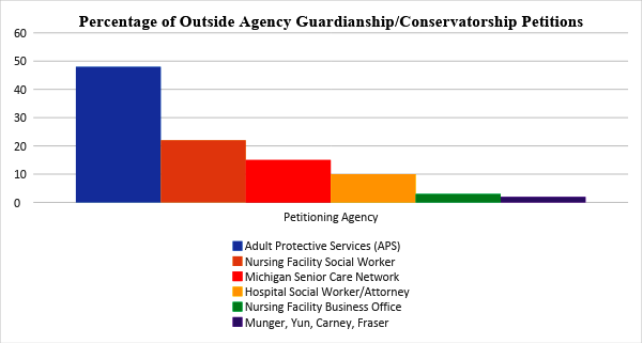
With two exceptions, each of the cases were the result of guardianship and conservatorship petitions filed by social workers or representatives of outside agencies, including APS investigators, the Senior Care Network, hospital and nursing facility social workers, attorneys and accounts receivables managers.
Of the petitions, the majority were filed by ten APS investigators.
 The Senior Care Network is a care management organization. Among its services is assistance filing for guardianship and conservatorship, for which the organization utilizes a dedicated social worker, Matthew Martin.
The Senior Care Network is a care management organization. Among its services is assistance filing for guardianship and conservatorship, for which the organization utilizes a dedicated social worker, Matthew Martin.
The petitioner must note “Specific facts about the adult’s recent or condition or conduct” that leads to them to believe a guardian and/or conservator are needed.
In 95 percent of cases, petitioner answers were summarized in one or two vague sentences, or an attached paragraph, noting mental or physical ailments such as dementia, confusion, memory problems, bipolar, diabetes, depression, physical mobility and hoarding.
Other, less specific examples included:
“Mental health hinders ability to maintain employment and make informed decisions or manage her own finances.”
“Joint weakness and mobility issues in apartment. Has issues with hoarding.” “Altered mental status.”
“Non-engagement in mental health services.”
“Does not make sound decisions re: physical health and finances.” “He is declining medication. Lack of insight into his diagnosis.” “A lack of civilization.”
“Patient came in for dizziness and confusion. Incompetent to make decisions for medical care.”
“DPOA will not provide information needed for Medicaid application to nursing facility.” “Family has not paid facility bills and there are other outstanding bills.”
The overwhelming majority of petitions (98 percent) were not corroborated by any evidence, whether in the form of an official diagnosis from a doctor or a medical history.
The Powerless Power of Attorney

Probate Court petition
On the first page of the petition, there is an opportunity to identify any individuals the perspective ward identified in estate planning documents such as holders of a Durable Power of Attorney (DPOA) or Patient Advocacy Designation. According to Michigan statute, such an individual has priority over the appointment of a professional guardian or conservator.
Only 15 percent of petitions made note of anyone named in an estate planning document.
In those cases where such individuals were identified, they were either not present at the initial hearing, or the petitioner claimed they were unsuitable without offering any evidence to substantiate why. The presiding judge then tossed out or invalidated the documents, and guardianship and conservatorship was given to Munger, Yun, Fraser or Carney.
There were also cases in which the holder of a DPOA was also placed under guardianship.
In 2016, Martin and the Senior Care Network petitioned for the guardianship of a then–83-year- old Clarkston, Michigan, woman named Doreen who was a resident of a Lake Orion long-term care facility.
The petition noted her husband Ralph as the holder of her DPOA and added, “DPOA will not provide information necessary for Medicaid App. to nursing facility.”
Presiding Judge Hallmark gave temporary guardianship of Doreen to Carney.
One month later, while Doreen’s full guardianship case was pending, Carney petitioned for guardianship of Ralph, stating that he had “Difficulty with memory and comprehension” and added that his Veteran’s Administration benefits needed to be managed.
Hallmark ultimately gave guardianship of Ralph to Fraser.
The Missing Family
 Page two of the guardianship petition includes an available box in which to list any of the ward’s known family members. Like the holders of a DPOA, family members have statutory priority over the appointment of a professional guardian.
Page two of the guardianship petition includes an available box in which to list any of the ward’s known family members. Like the holders of a DPOA, family members have statutory priority over the appointment of a professional guardian.
In 65 percent of occasions where none was noted on a petition, the ward did, in fact, turn out to have a family.
Such was the case of a then 69-year-old Pontiac woman named Cynthia. In the petition for guardianship, an APS investigator alleged that Cynthia suffered from “three strokes, psychosis mania, expressive aphissa [sic] and is often paranoid that people are after her.”
While acknowledging that Cynthia did have a married couple who held her Power of Attorney, the investigator noted that they weren’t “Able to assist her anymore.” The box notating families was referred to the “Attorney General.”
Similarly, a three-paragraph report filed by Cynthia’s Guardian ad Litem insisted that she “Has no family and lives alone.”
However, Cynthia had an adult daughter, Heidi who filed a petition to terminate her mother’s guardianship three months after O’Brien had assigned Carney to the position.
In an accompanying brief, Heidi stated that she had not been not served the initial petition or any notice prior to her mother’s guardianship hearing. Why neither APS nor the Guardian ad Litem identified the fact that Cynthia had family is unknown.
Suitably Trained Investigators?
Such glaring errors in a petition, alongside claims of incapacity made without corroborating medical evidence, raise the question as to whether social workers, such as APS investigators, have been properly trained before conducting an investigation of a potential adult ward.
Dr. Peter Lichtenberg, PhD., is a Clinical Geropsychologist, Professor of Psychology at Detroit’s Wayne State University and Director of the Institute of Gerontology.
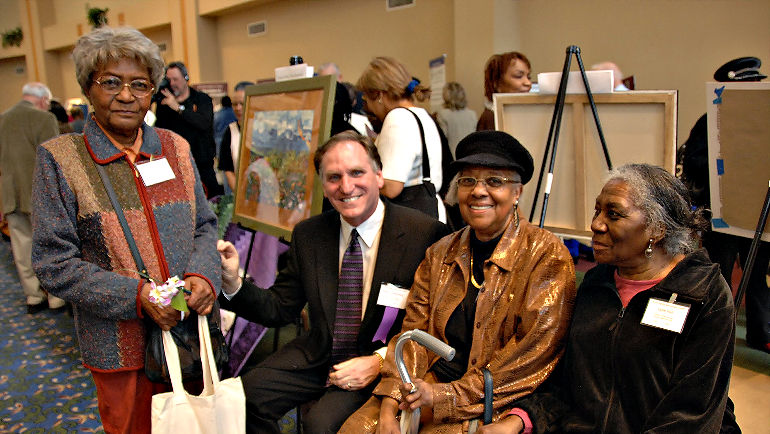
Dr. Peter Lichtenberg with older clients at WSU Institute of Gerontology.
“I’ve been working very closely with APS supervisors and staff over the last four years,” he says. “I found that, like all people who enter the caring profession, there’s a lot of talent and skill. There are huge caseload burdens. Often, [investigators] come from Child Protective Services [CPS] or domestic violence. So, they’re coming in at a deficit in terms of understanding geriatric issues.”
“It takes a lot of experience and it takes a team approach,” he adds. “Unfortunately, these workers are out there investigating a case under a time pressure and by themselves.”
In a 2016 petition for the guardianship of a then–88-year-old Korean War veteran named Raymond, an APS investigator claimed that he “Suffers from memory loss. He is not able to manage medications. He is not able to handle his daily living skills.”
However, according to Raymond’s Guardian ad Litem, his attending nurse stated that “She did not understand why APS was involved in this case or why an emergency petition was filed. It is [her] professional opinion that there is not a need for an emergency appointment of a guardian.”
Presiding Judge Ryan did not concur and appointed Carney.
The Guardian ad Litem
Seventy percent of cases reviewed began with an Emergency Petition for Guardianship.
This meant that Yun, Munger, Carney or Fraser were appointed to the role of temporary guardian on the same day the petition was filed or shortly afterwards. Coinciding emergency petitions for conservatorship have also been granted. The prospective ward was neither given notice nor an explanation of their rights under Michigan law before being placed under their control.
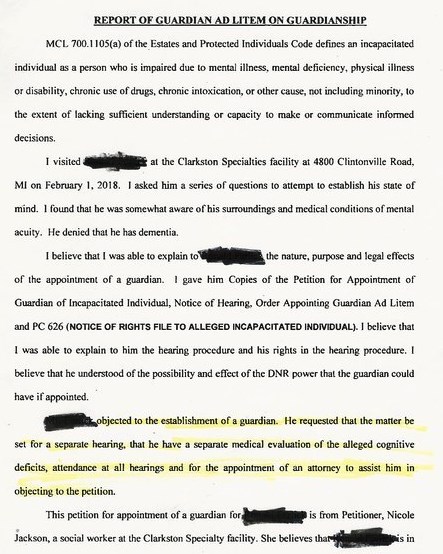
Gaurdian Ad Litem report that notes client does NOT want guardian and wants to know how to petition to remove the guardian.
Ordinarily, those rights are explained to the prospective ward during a personal visit from a GAL.
They include the right to contest the petition, to be present at the hearing, to be represented by legal counsel and to request limits on the guardian’s powers.

William Spern, atty. GAL
In a written report, which must be filed no later than 24 hours prior to a guardianship hearing, the GAL is instructed to note whether there are alternatives to the appointment of a full guardian, if the proposed ward wishes to exercise their right to contest the petition and be present at the hearing, or whether there are any objections to the execution of a DNR. The report should conclude with a GAL’s recommendations, either for the appointment of a guardian and/or conservator, or for a contested hearing.
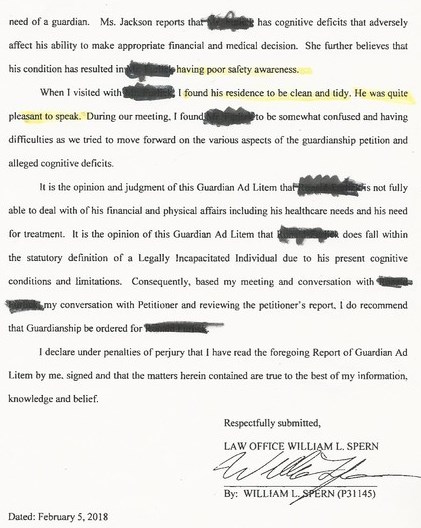
In 100 percent of the 2,278 cases reviewed, the GAL was an estate or probate attorney with no discernable psychological or medical background.
Nevertheless, GAL reports—which varied anywhere from a five-page, detailed investigation to a few paragraphs to no narrative at all—included the GAL’s own determination of a potential ward’s incapacity.
In numerous cases, a GAL concurred with a guardianship petition, claiming that the proposed ward had some form of dementia or memory impairment, if they could not answer one or all of four questions pertaining to the date, their birthday, the day of the week and the name of the US President.
“Nobody can ask four questions and determine whether someone has capacity or not,” Dr.
Lichtenberg says. “Ideally, [a GAL] would join forces with somebody who has a background like mine where they would get a good assessment of cognitive strengths, weaknesses, mental health problems and try to apply those to the legal standards.”
Objecting but Not Present
Curiously, in 97 percent of the occasions when a potential ward emphatically voiced objections to a guardianship, the GAL also claimed that the individual waived their right to be present at the guardianship hearing.
A Director of Nursing for multiple long-term care nursing facilities for over two decades, “Gladys” requested an alias be used.
“We have patients and residents who come in who have Medicare, which provides for a 20-day stay at a long-term facility,” she says. “If they are still in need of care, you will see a petition go out for temporary guardianship. The [GAL] will visit for all of five minutes, if that. They will say they are from the court and ask me or a nurse caring for the patient to sign off on their visit.”
“Half the time, the patient may not know what’s going on because they don’t tell the patient anything,” she adds. “After a visit, I’ve gone in and asked the patient, ‘What did they say?’ The patient tells me, ‘I don’t know, they said they were a lawyer.’ Then, I say, “Did they ask you anything?’ and the patient says, ‘No.’”
Gladys emphasizes that “A lot of times, [GALs] don’t even see the patient because the patient is in physical therapy and they don’t want to wait that long.”
Lawyering Up
Even when the GAL recommends a contested hearing or, on rare occasions that the petition be denied, it does not mean an individual targeted for guardianship is out of the woods, something particularly true in cases involving APS.
When a contested hearing is recommended, the presiding judge orders an Independent Medical Examination (IME) to be conducted on the prospective ward and appoints legal counsel. The court has published a roster of 14 Michigan-based psychologists who “Have expressed interest in doing independent evaluations for Oakland County Court proceedings.”
However, in 97 percent of IME orders reviewed, only three doctors were regularly used, as well as one attorney who also is a “limited-license psychologist.” The results of these examinations are not made part of the public record. Judges such as Ryan have consistently ordered them to be “Faxed directly to chambers.”
Meanwhile APS invariably lawyered-up in advance of the hearing.
One of the attorneys they typically use, Heidi Aull, is employed by former public administrator Cecil St. Pierre, who resigned from the position in 2017 after WXYZ’s investigation into the opening of deceased estates without notifying next of kin. APS has also been represented by a lawyer assigned from the Michigan Attorney General’s office.
The ward, on the other hand, is usually provided legal counsel from the same pool as the Oakland County GALs.
Contested hearings involving APS always resulted in guardianship.
A 2015 petition filed by an APS investigator against a then-84-year-old White Lake, Michigan, woman named Betty asserted that the “Proposed ward’s spouse died in 2013. No children. Home is paid off. No other family. Ward has signed papers and doesn’t remember what she signed. Doesn’t always know what she has done with her money.”
Presiding Judge O’Brien ordered a contested hearing for which APS retained a Special Assistant Attorney General.
After the hearing, O’Brien appointed Fraser as Betty’s full guardian. Two months later, Betty wrote a letter to the judge.
“I am sorry to report that I have [had] no word from Mr. Fraser since he first advised me he was my full guardian,” she asserted. “I don’t know if I get an allowance. I have a small dollar amount in my account I assume is no longer mine. I’m lost. My medications come in the mail and have not been forwarded to me. I need them! Please advise me what to do.”
By 2018, Fraser had moved Betty to a nursing home. In an account the public administrator filed that year, between patient pay and his own legal fees, he had spent all but $367 of Betty’s annual $20,000 social security income.
Double Standards
Guardianship and conservatorship cases at Oakland County rarely have a happy ending. With few attorneys willing to take on their cases at an affordable rate, families often enter the Oakland County Probate Court unrepresented by an attorney (pro se). Since these are civil cases, the family does not have access to a public defender and, they claim, legal aid organizations are either unresponsive or unwilling to assist.
Without knowing their rights under Michigan statute or all 61-pages-worth of Michigan court procedures, families enter hearings at a marked disadvantage and without a clue as to what to expect.
Requests for interviews concerning the Oakland County Probate Court made by this investigation to legal aid organizations, both inside and outside the county, went unanswered. The Detroit office of the ACLU declined without noting a reason.
In numerous cases observed over successive Motion Days, although Ryan at least attempted a modicum of empathy, families appearing pro se were bullied and berated by Callaghan,
Hallmark and O’Brien, who not only held families to the same standard as the public administrators but, in some cases, gave them far less latitude.
For example, at no time was a public administrator admonished for being late for a hearing.

Nancy Haddock’s eventual fate as ward.
Conversely, family members who do not appear on time can lose their case because of it. When they push back, they are threatened with Contempt of Court or the judge calls in the Oakland County sheriffs who threaten removal and/or arrest.
Catherine Haddock, the daughter of 76-year-old Yun ward Nancy Haddock, states that, before the first hearing on her 2016 petition for the guardianship and conservatorship of her mother, a member of Hallmark’s staff warned her that Hallmark would never allow Catherine to be a conservator owing to bankruptcy on her public record.
She says she was encouraged to accept a public administrator instead.
While such a determination by Hallmark falls under judicial discretion, court records show that Carney filed for Chapter Seven Bankruptcy in December 2010.
The Fight of Their Lives

Pauline in her 20’s/Family photo
Once a guardianship and/or conservatorship case against an individual is set into motion, both the wards and their families end up in the fight of their lives.
Since the case is still in litigation, the niece of a Bloomfield Hills woman, who was placed under Carney’s guardianship in January 2018, asked that both she and her aunt be identified using an alias.
According to her niece Marie, Pauline was born in 1922 in a small town in the Kentucky Appalachians. Orphaned during the Depression, she was separated from her siblings and sent to stay with relatives in Michigan.
Pauline graduated high school early and had been a secretary at the Dearborn “Glass House” headquarters of the Ford Motor Company for only a year before she was selected, out of 300 of her peers, to become the first female Executive Secretary to the company’s Vice President.
She fell in love with and married a local businessman who surprised her by purchasing a lot in Bloomfield Hills and building a magnificent home upon it. Pauline’s husband died of a sudden heart attack in 1973. The couple had no children, and a heartbroken Pauline never remarried but lived alone in the home they built together until 2018.
As Marie grew up, she and her aunt became “Extremely close, like a mother and daughter,” Marie says. “She was vibrant, proud of where she came from and where she ended up and she was very independent. Even in 2017, she was raking her own leaves.”
However, by January 2018 and at the age of 96, macular degeneration left Pauline partially blind. According to Marie, she was also prone to bouts of anxiety.
The Life-Altering Phone Call

Pauline prior to guardianship/Family photo
Since Pauline’s vision left her unable to dial her phone accurately, Marie recalls that “One early morning, my aunt crossed the street to ask a neighbor [to] call her friend. Another neighbor drove by and saw her and called the police. The neighbor told the police that she found Pauline wandering the streets. That just wasn’t true.”
Pauline was transported by the police to St. Joseph’s Mercy hospital and diagnosed with a Urinary Tract Infection. At the time, Marie was still living in Kentucky.
On March 2, 2018, Martin and the Senior Care Network filed an emergency petition for guardianship in the Oakland County Probate Court against Pauline. It made no mention of any family and specifically requested Carney as Pauline’s guardian. She was appointed as a temporary guardian by presiding Judge Hallmark at a March 7 hearing.
Neither Marie nor Pauline were present.
However, Pauline certainly understood that something had happened to her involving the court. On the day Carney was assigned, Pauline called her niece in a tearful panic begging her to come to Michigan immediately. Marie then reached out to Carney’s office and spoke with an assistant.

Oakland Co. Public Administator Jennifer Carney.
“I told her that I had stayed with my aunt for 20 months when she had gallbladder surgery, that I was perfectly happy to take care of her again and that my aunt wanted me to,” Marie says. “But I was told that [Carney] needed to do some more investigation. All Carney had to do was run a background check on me and tell the court that I was willing to look after my aunt, but she didn’t consider any of that. Carney had made up her mind that she was going to be my aunt’s guardian and there was nothing I could do about it.”
Medicaid and Medilodge
In Michigan, an unmarried person does not qualify for long-term Medicaid assistance if they have over $2,000 in countable assets (cash, stocks, bonds, investments, credit union, savings, and checking accounts).
Inventories filed by Carney in May and June 2018 listed Pauline’s assets as a $307,580 home, a 2003 Jaguar, which the public administrator valued at $3,900, a $73,313.30 checking account balance and $11,124.96 in shares. According to Carney’s own accounting, only one day after she had been appointed as temporary guardian, she charged Pauline’s estate $84 to “Prepare and submit [an] initial Medicaid application.”
Carney’s office subsequently received notification from the Michigan Department of Health and Human Services (MDHHS) stating that Pauline had been approved for Medicaid benefits that were also retroactive.
As soon as Marie arrived at her aunt’s hospital bedroom, she called Carney’s office again. This time, she was able to get the public administrator on the phone.
“I told her that I wanted to take my aunt home,” Marie recalls. “She told me, ‘No, you can’t do that. We’re going to put her in Medilodge until we get it straightened out. I didn’t know anything about the place.”
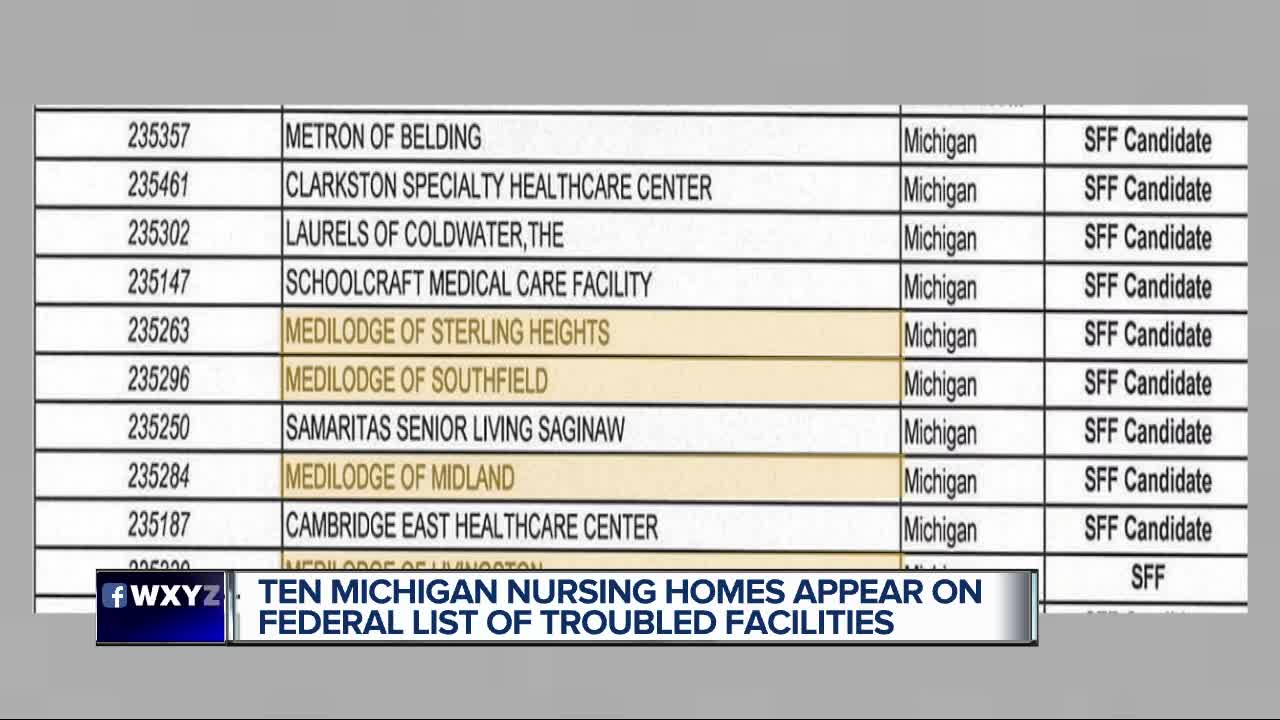 Calling itself a “leading provider of long-term skilled nursing care and short-term rehabilitation solutions,” Medilodge operates at least 50 facilities across Michigan, and not all with flying colors.
Calling itself a “leading provider of long-term skilled nursing care and short-term rehabilitation solutions,” Medilodge operates at least 50 facilities across Michigan, and not all with flying colors.
In 2017, the Michigan Department of Licensing and Regulatory Affairs (LARA) determined seven deficiencies at the Medilodge facility in Southfield that included inadequate records of food served at the facility, medical equipment stored in patient shower rooms and an untrained staff member. A FOIA request to the MDHHS revealed that, between 2016 and 2018, Medilodge of Southfield received almost $30 million in patient Medicaid disbursements.
It was in that facility’s lockdown ward that Carney told Marie she was placing her aunt. Marie had to break the news to Pauline in her St. Joseph’s Mercy Hospital room the night before she was to be discharged to Medilodge.
‘She started crying, shaking, she was having an anxiety attack,” Marie recalls. “She’d never lived anywhere else but her home. She didn’t want people undressing her and taking her belongings.”
When Marie saw the facility herself, she says, “I just died inside.”
“The place was a dump,” she adds. “It smelt horrible. My aunt was sharing a small room with someone else. She didn’t want me to leave her there, so I laid down next to her.”

Injuries to Pauline’s back after fall at Medilodge.
At 2 am, the facility director told Marie to leave. Even though she always stayed at Pauline’s home whenever she visited, Marie said that Carney was emphatic in forbidding her to do so and had changed the locks to the house.
Tossed out of Medilodge and with nowhere to go, Marie spent a sleepless night parked in a Walmart lot worried sick about her aunt. The following day, she received a call from Medilodge informing her that there had been an “incident” involving Pauline. Marie rushed to see her.
“My aunt had contusions on her head, bruises on her chest and arms. It looked really bad,” Marie says. “She told me that her roommate had come up behind her, hit her and shoved her down. Her head hit the metal heater in the room. The cut on her head never healed.”
“Carney told me it was not a big deal,” Marie remembers. “I said, ‘It’s a big deal to me!’”
After more incidents at Medilodge, Marie decided enough was enough and began to call attorneys across Oakland County. No one would take her case.
“They told me that if a judge had assigned someone as a guardian in Oakland County, there was nothing I could do,” she states.
Fighting Back
Marie began to do her own research. Armed with a little more knowledge, she filed petitions to replace Carney with herself as Pauline’s guardian and conservator. Pauline told her GAL that she wanted her niece to serve. Under Michigan statute, Marie therefore had priority over Carney and, in his report, the GAL recommended that Marie’s petitions should be granted.

Patient at Medilodge does not look happy to be there, but Medilodge put this photo on their website.
But, on April 25, shortly before they were to go up in front of Hallmark, Marie says that the GAL approached her with some disturbing news.
“He told me that Carney was willing to accept me as a co-guardian but that she was going to be the conservator,” Marie recalls. “Carney also told him that, if I fought her on it, she would make sure my aunt stayed a nursing home for another six weeks.”
Terrified that Carney would make good on her threats, Marie agreed to her terms. As co- guardian, Marie was finally able to gain access to Pauline’s home. While she was getting it ready for her aunt, there was a knock on the door.
“It was a man with a tow-truck,” Marie says. “He said he was there to take my aunt’s car.” A May 2 entry in Carney’s account authorized the removal of Pauline’s Jaguar.
As soon as she returned to Michigan, Marie took Pauline out of Medilodge and brought her home. For the approximately 42 days Pauline was a Medilodge resident, Carney charged her estate a total of $12,708.00 in patient pay expenses.
Petition, Argue, Repeat
For reasons then unknown to Marie, Carney would not let go of the conservatorship.
“She said, ‘I will never give up conservatorship to you,’” Marie recalls. ‘She didn’t say why.” At a hearing on July 11, Hallmark dismissed Marie’s petition to have Carney replaced.
“The judge didn’t listen to me,” Marie recalls. “She wasn’t mean to me, but she went with Carney’s recommendations every time.”
“I talked to some people at the court clerk’s office,” she adds. “They told me it wouldn’t do me any good to get an attorney.”
When a home health nurse visited Pauline, she was shocked when she saw the list of medications Medilodge had been giving her.
“They had her on psychotic drugs, why?’ Marie wonders. “All she had was a UTI. The nurse even agreed with me that there was no way my aunt was incompetent.”
Marie filed again and, when she went back to court for the fourth time, Carney doubled down.
“She said that she wasn’t comfortable with me being guardian or conservator,” Marie asserts. “Since I lived with my aunt and didn’t pay rent, she called it a ‘conflict of interest’. Then, she told me I would need to move out and get my own place before she would consider allowing my petitions to go ahead.”
Before the hearing, Marie asked Carney about her mother’s Jaguar.
“She first looked at me like she didn’t know what I was talking about,” Marie says. “Then she told me that she had sold it.”
“I knew that, the longer me and my aunt remained in Oakland County, the greater the chances that she was going to end up broke, she adds. “If that happened, Carney would sell her house.”
So, Marie came up with a plan to move Pauline back to Kentucky. She petitioned again to have Carney removed and Pauline returned to her care and, this time, included a letter to Hallmark summarizing the case, Pauline’s medical records and statements of support from neighbors and nurses.
Her petition was heard on the Motion Day of August 8, 2018, and was observed as part of this investigation. Whether it was because of the attendance of the press, Marie’s relentlessness or a combination of both, the judge suddenly relented and returned complete custody of Pauline back to her niece.
“I was in shock,” Marie says.
When Hallmark clarified that she was also terminating Carney’s conservatorship, the public administrator turned on her heels and stormed out of the courtroom. In her final accounting, Carney asserted that the “Court granted petitions allowing me to resign.”
According to that account, in just five months, she had blown through almost $50,000 of Pauline’s money.
One income line item noted a “$200 gain from the sale of automobile. ” Exactly how much Carney sold the Jaguar for and to whom is unknown. Carney’s account did not include any record of the sale.
It took Marie months to undo every action Carney had taken since she was given control of Pauline’s life. She and Marie went back to Kentucky together. It was in the state she was born that Pauline passed away in August 2018.
“She’d lost so much weight at the nursing home, she just couldn’t bounce back,” Marie recalls through tears. “It was all so unnecessary. If Jennifer Carney had gone by the law, or morality or listened to anything I had to say… All I can say to anyone who is going through this is to just keep fighting in any way you can.”
Links to remaining sections:
Part two of five: Protected in Hell
https://www.dailykos.com/stories/2019/8/23/1880806/-The-Fortress-Part-Two-of-Five-Protected-in-Hell
Part three of five: Profiting from Protection
Part four of five: The Consequences of Protecting Justice
Part five of five: Protected by Secrecy and Ageism
https://www.dailykos.com/stories/2019/8/23/1880891/-The-Fortress-Part-Five-of-Five-Protected-by-Secrecy-and-Ageism
LAWSUIT ALLEGES MICH. NURSING HOME IMPRISONED OAK PARK SENIOR, HELD HER FOR RANSOM
©GretchenRachelHammond2019
(773) 368-3782

Gretchen Rachel Hammond
Gretchen Rachel Hammond is an award-winning freelance investigative journalist based out of Chicago. Her work has won or been nominated for four successive Chicago Press Club awards, been recognized by the National Association of Lesbian and Gay Journalists (NLGJA), and covered topics such as criminal justice, abuse at ICE detention facilities, and alleged discrimination on the part of the Illinois Department of Children and Family Services leading to the unnecessary separation of children from their parents.
______________________________________________________________
 Other VOD stories on state terrorism against elders, families and children include many on world-renowned hero the late Maryanne Godboldo, who fought off a SWAT-team attack on her Detroit home in 2011 during which CPS kidnapped and forcibly medicated her 13-year-old daughter.
Other VOD stories on state terrorism against elders, families and children include many on world-renowned hero the late Maryanne Godboldo, who fought off a SWAT-team attack on her Detroit home in 2011 during which CPS kidnapped and forcibly medicated her 13-year-old daughter.
Godboldo died of a massive brain aneurysm the night before Wayne Co. Prosecutor Kym Worthy scheduled a THIRD criminal trial against her in 2016. Two Judges twice threw out the same charges. Ms. Godboldo and her family carried out a years-long battle in juvenile and criminal courts, winning the release of Godboldo’s daughter to her family. They continue Maryanne’s battle on behalf of other state victims to this day.
See: http://www.justice4maryanne.org.
Others VOD has covered include:
- Lennette Williams and her daughter Mailauni Williams, who have conducted a battle to remain united for over 30 years;
- Luis and Cecilia Espinoza, who won their juvenile court battle to keep their 5 children;
- Parents Tamikia McGruder and Arthur Simmons, who defeated CPS’ battle to take their 6 children;
- Wanda Worley and her daughter Sharmian Sowards,
- Kristina Brockington and her mother Regina Gargus
To read more about these cases, put their names in the Voice of Detroit search engine.
RIGHTS UNDER MICHIGAN LAW RE: GUARDIANSHIP APPOINTMENTS
Rights of an individual with a guardian:
http://voiceofdetroit.net/wp-content/uploads/Rights-of-individual-with-guardian.pdf
Powers and duties of a guardian:
http://voiceofdetroit.net/wp-content/uploads/Powers-and-duties-of-guardian-mcl-700-5314.pdf
Michigan Mental Health Code re: placement of wards with developmental disabilities
http://voiceofdetroit.net/wp-content/uploads/MICHIGAN-MENTAL-HEALTH-CODE-RE-PLACEMENT-OF-WARDS.pdf
Guardianship petitions: Summary under Michigan Law
http://voiceofdetroit.net/wp-content/uploads/Guardianship-petitions-Summary-under-Michigan-Law.pdf
______________________________________________________________
 Donations for the Voice of Detroit are always needed to keep this paper going. It is published pro bono by people on limited incomes. Ongoing expenses include quarterly Lunar Pages web host charges of $359, charges for court documents internet fees, office supplies, Post office box, etc. Please, if you can:
Donations for the Voice of Detroit are always needed to keep this paper going. It is published pro bono by people on limited incomes. Ongoing expenses include quarterly Lunar Pages web host charges of $359, charges for court documents internet fees, office supplies, Post office box, etc. Please, if you can:
DONATE TO VOD at
https://www.gofundme.com/VOD-readers-up.
Mail checks to M. Diane Bukowski, Editor Voice of Detroit, LLC, P.O. Box 35278, Detroit, MI 48235
______________________________________________________________





I hope you received part one of Kenneth Waller, estate how Oakland County Judge Daniel A. O’Brien removed my daughter Crystsl Waller who has 2 associates college degrees as Personal Representative ofher father estate and gave the position to Atty. Thomas B. Faser who is not a family member. Atty. Thomas Fraser told my daughter that her father’s house is his now & he was kicking us out. He tried to get a 46th district court Notice to Quite but they wouldn’t issue on so he sent a 36th district court Notice to Ouite that’s out our district. My daughter calked and they said they had no such filing. She called Atty. Thomas Fraser & told him he got mad and went to Judge O’Brien and he issued a court order for us to move now the law is probate court can not issue an Order/Notice to Quite. My daughter told Judge O’Brien he was violating her constitutional rights he said what that’s got to do with it. We were told that her father was divorce so my daughter told Judge O’Brien he said”who told you that” please help us find an atty.
I hope you received part one of Kenneth Waller, estate how Oakland County Judge Daniel A. O’Brien removed my daughter Crystsl Waller who has 2 associates college degrees as Personal Representative of her father estate and gave the position to Atty. Thomas B. Faser who is not a family member. Atty. Thomas Fraser told my daughter that her father’s house is his now & he was kicking us out. He tried to get a 46th district court Notice to Quite but they wouldn’t issue on so he sent a 36th district court Notice to Ouite that’s out our district. My daughter calked and they said they had no such filing. She called Atty. Thomas Fraser & told him he got mad and went to Judge O’Brien and he issued a court order for us to move now the law is probate court can not issue an Order/Notice to Quite. My daughter told Judge O’Brien he was violating her constitutional rights he said what that’s got to do with it. We were told that her father was divorce so my daughter told Judge O’Brien he said”who told you that”
Part 3 of kenbeth waller,estate career development said to check for my daughter money ck with 1200 Pontiac thats the cout house what do that have to do with her probate case. Now the decedent house 19011 Nadol drive Southfield, Mi is for sale for $164,000. The agent is Bejamin Nelson. Now atty. Fraser asst. is Stephanie Nelson who i was told his sister heresay.Stephanie Nelson got mad cuz i went to 46th district cout to get our belongings said we should have move lot of my daughter suites was gone and shoes atty fraser had my underware spread ou on display. Atty. John Yun had my children father mail transferred to his office without my daughter knowledge she was the PR and he was made Fiduciary. The Court. Clark said he never heard of 2 PR of an estate. Our mail has been compermise our apartment mailbox broken into twice no one else. My daughter license came to the apartment with the Po box address on the envelop how did they know were we lived. My income tax tampered with i called reported it the next day it went through. My daughter in 2016 tax was taken by Human Service which she should not owe they even kept more than they said she owe. After fraser criminal eviction we went to Red Roof In someone use a key to come in on us my big dog stood up the man close the door the manager said the maid droped her key. Mayor Brenda Lawance had someone call after the eviction he told us to pick up to gift cards and suggested American Extended Stay they kept changing our room rate someone came in on us with a key twice and onecday i got off elevator caught maintenance open door my daughter was by herself . on time we beleive it was the lawn man he said he was the remodeling man. Oh my daughter was PR she made appt. with her. Father atty Stephen korn he would not give her the up dated papers in her father file he turn the papers so she could see her and her bother Kenneth Waller Jr name was on the papers. My daughter sopeona Korn & family. Atty Korn sent my daughter a letter stating he sent the file back to his father & if she contact him again he would put a PO on her. She file a just cause but she couldnt get a court date. Thank you.
Kenneth Waller, estate Oakland County. They came drill the door open & told my daughter & i to leave with the cloths on our back. The had not the Sheriff but the southfield police department & a k-9 unit like it was a drug bust. The house was locked up with our personal belongings. We went to 46th court got an order to get our belongings and when we went to move atty fraser was there he said i could not park in driveway its personal property i’m disable he told us when we got in to go to the back. He would not let us pack i had to call the southfield police the officer told atty fraser we have an court order he have to let us move. Atty. Fraser sold the house for $33,000. The law is 720.219 Sec. 19 states no public administrator or fiduciary of any estate acquire any interest in or bargin for any property his signature all over as owner. Judge O’Brien approve an order suing us for property tax my daughter was in a tax agreement he sued 4 10,000. Unpaid rent $46,000 vaule of home 35,000, eviction $6,397. Atty fees $6,000 total $113,477.25 Judge O’Brien approved order for $75,000. My children or i never got 1cent from the estate. The estate was charge for us going to hud, civil rights. Judge O’ Brien always told me i wasnt the wife so i was no part of the case. My daughter Crystal Waller was PR was attending Career Development Assessment Training on Parklawn St., in Oak Park, MI 5/11/2010-8/17/2010 everyone got there $10,000 but my daughter she had a meeting with management they told her
Hi, my name is Nadine my children father died (Kenneth Waller) he had an handwritten will. My children father we was told divorce the Judge Daniel A O’Brien asked my daughter who told u that.The suppose wife went on to say she was the wife and took what she could we were told by an attorney she committed fraud. Judge Daniel A. O’Brien took the PR from my daughter who has 2 assoc. college degrees. He gave the PR to one of his appointees attorney Thomas Brennan Fraser who told us to get out of my children father house because it belong to him now. 46th Civil Court would not issue a Notice to quite so Attorney Thomas B. Fraser went to Judge O’Brien and he wrote an Order of eviction. In Michigan a probate Judge can not evict only civil court but civil court refused to issue him an eviction. In Michigan in 2012 the Sheriff suppose to evict but in my children case it was the Southfield Police and a k-9 unit. They drill the door open and told my daughter and I to get out with only the cloths on our back. We had to go to 46th district court to get out personnel belongings out and Attorney Thomas Fraser still refuse we had to call the Southfield Police department and he told him we had an court order. Under Mich law Sec. 5581. the house belonged to my children a two other attorneys told us it belong to my children. He sold a hundred twenty thousand dollar house for thirty three thousand and now has it on the market for one hundred sixty nine 19011 Nadol Dr., Southfield, Mich and I beleive its a relative of Thomas Fraser or we were told was his sister S. Nelson.My children never sign off on that house it was out right stolen. Sharon Waller ex-wife took the 401(k) my daughter was Personal Rep was told it was in my name she had it transferred in an account were she work Comerica Bank. Prudential will not give any information on insurance and my children father attorney Stephen Korn of Warren Mich told my daughter when she was Personal Rep she contact him again he would put a PO on her. She did a Motion but the Judge would not allow a court date. John Yun was also at one time assign to the case.
I hope and pray someone sees this, please contact: HUNT, HAMLIN & RIDLEY law firm!! They specialize in fighting giants and scammers. (973)242-4471